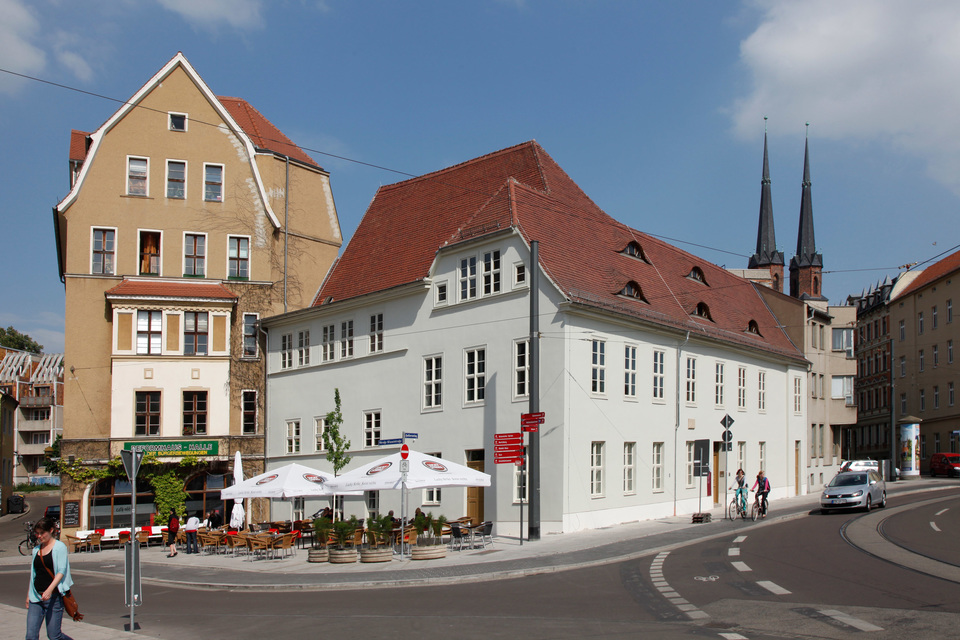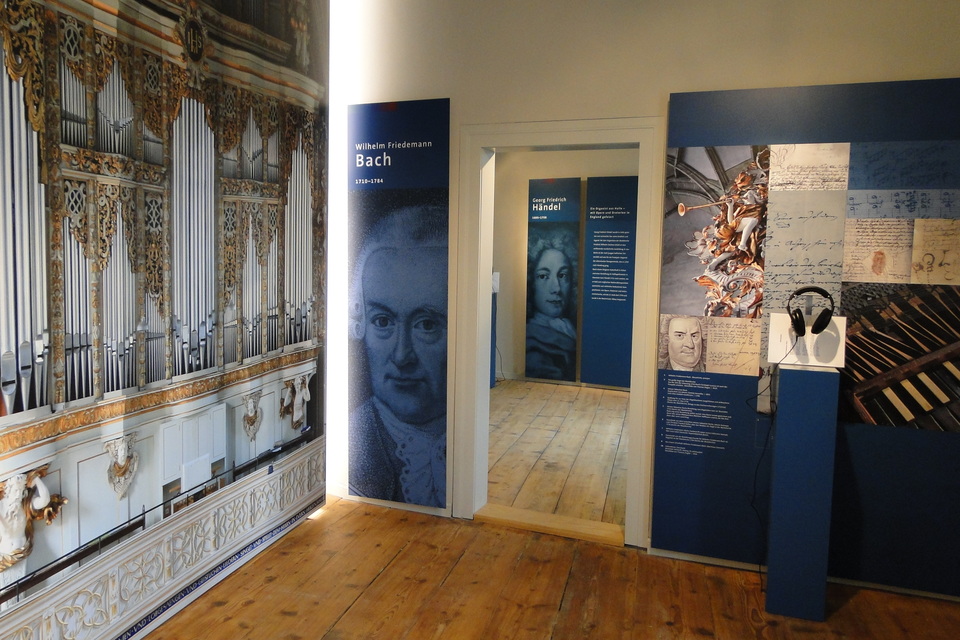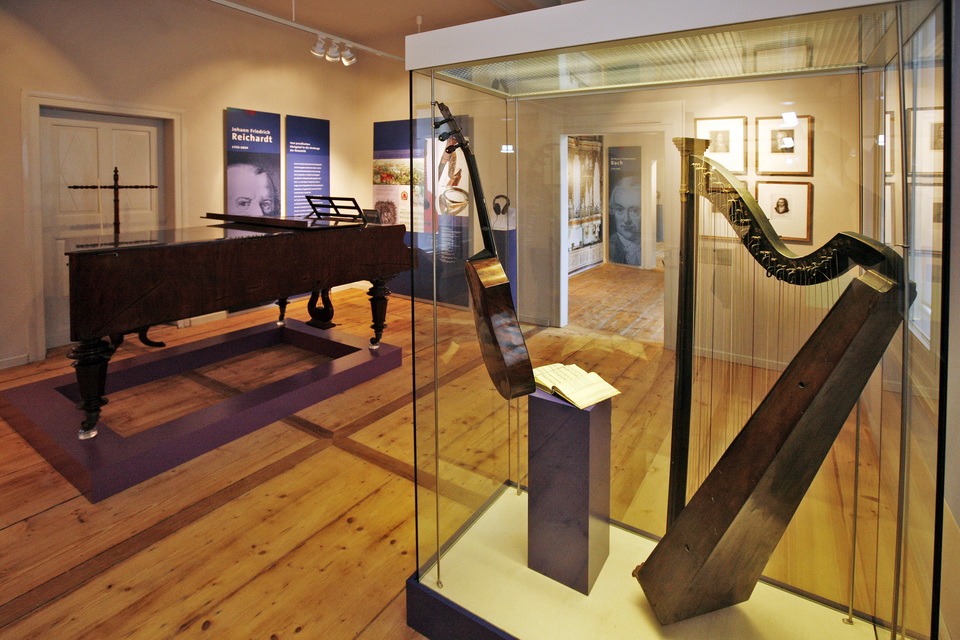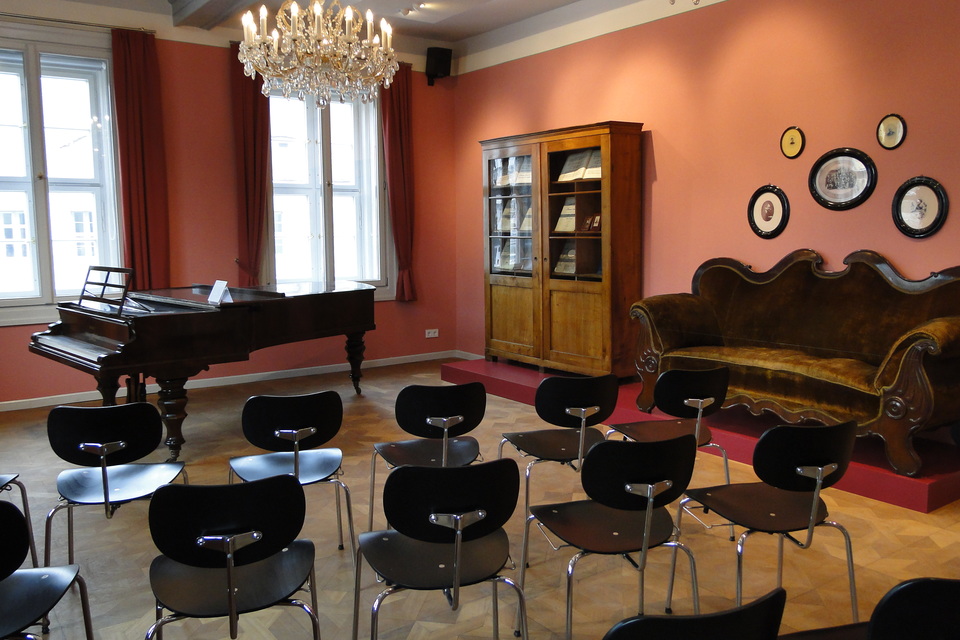





Wilhelm-Friedemann-Bach-Haus
Dauerausstellung "Musikstadt Halle" (1. Etage)
Große Klausstraße 12
06108 Halle (Saale)
Telefon +49.345.47234992 (nur während der Öffnungszeiten)
Web: www.wfbachhaus.de
E-Mail: information@wfbachhaus.de
April bis Oktober:
Fr und Sa 10-18 Uhr
November bis März:
Fr und Sa 10-17 Uhr
Seit 2012 ist das Wilhelm-Friedemann-Bach-Haus wieder öffentlich zugänglich. Hier wohnte der älteste Sohn Johann Sebastian Bachs für mehrere Jahre, ehe er 1770 Halle verließ.
Über die Geschichte dieses interessanten Gebäudes kann man sich im Eingangsbereich informieren. Das Obergeschoss beherbergt die Dauerausstellung der Stiftung Händel-Haus zur "Musikstadt Halle".
Die Präsentation versucht, einen Überblick über die reiche hallische Musikgeschichte vom Mittelalter bis in die jüngste Vergangenheit zu vermitteln. Im Mittelpunkt stehen Komponisten, die in Halle gewirkt haben: Samuel Scheidt (1587-1654), Georg Friedrich Händel (1685-1759), Wilhelm Friedemann Bach (1710-1784), Johann Friedrich Reichardt (1752-1814), Carl Loewe (1796-1869) und Robert Franz (1815-1892). Ihr Leben und Wirken wird exemplarisch vorgestellt, und an Hörstationen kann man sich jeweils einen Eindruck von ihrer Musik verschaffen. In einem salonartigen Raum, der dem Komponisten Robert Franz gewidmet ist, werden neben dessen originalem Flügel auch Möbel aus seinem Besitz ausgestellt. Außerdem gibt es weitere originale Musikinstrumente zu sehen, darunter den Flügel von Carl Loewe. Im ältesten Teil des Hauses, der auch eine historische Bohlenstube aus dem 16. Jahrhundert beinhaltet, wird das häusliche Musizieren in Halle unter Einbeziehung wertvoller alter Instrumente dargestellt.
Deutschland verfügt über musikalische Traditionen und Nachlässe von außerordentlichem Wert: Händel, Schütz und Bach, Beethoven, Mendelssohn, Schumann, Brahms und Wagner sind - um nur einige Namen zu nennen - weltweit bekannte und geschätzte Komponisten. Ihr Wirken hat eine einzigartige Musiklandschaft wesentlich mitgeformt.
Zahlreiche Orchester, Chöre und Ensembles, renommierte Musikfestivals und -reihen, Musikerhäuser mit Museen, öffentliche Archive und Bibliotheken, aber auch private Sammlungen bewahren ihr musikalisches Erbe.
Diesen unschätzbaren Fundus gilt es immer wieder neu zu beleben und für die Gegenwart zu erschließen. Den in der Arbeitsgemeinschaft Musikermuseen Deutschlands zuusammengeschlossenen Häusern kommt dabei eine wichtige Rolle zu. In ihnen begegnen wir dem Werk von Musikern und Komponisten, die die Kulturnation Deutschland außerordentlich bereichert haben. Über das individuelle Portrait, über die Vermittlung des einzelnen Œuvres hinaus tragen die Musikermuseen aber auch zur Pflege musikalischer Tradition insgesamt bei. Die vorliegende Broschüre unterstreicht diesen Aspekt der Zusammenschau, und sie lädt zu einer Reise in die Musikgeschichte Deutschlands ein. Ich wünsche diesem Reiseführer regen Gebrauch und eine große Resonanz.
Bernd Neumann, MdB
Staatsminister bei der Bundeskanzlerin
Der Beauftragte der Bundesregierung für Kultur und Medien
Zitat: Vorwort zur Broschüre der Arbeitsgemeinschaft "Musikermuseen in Deutschland", 2007.